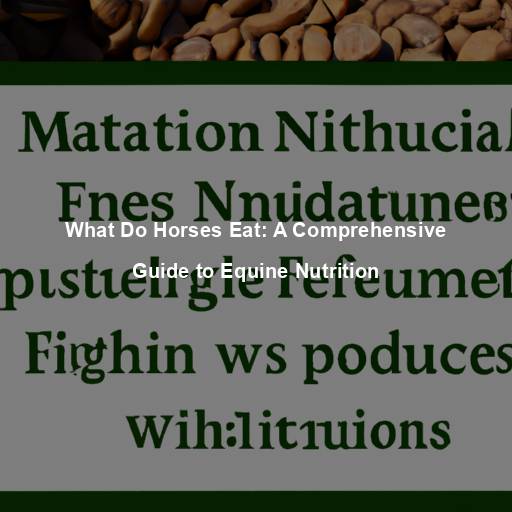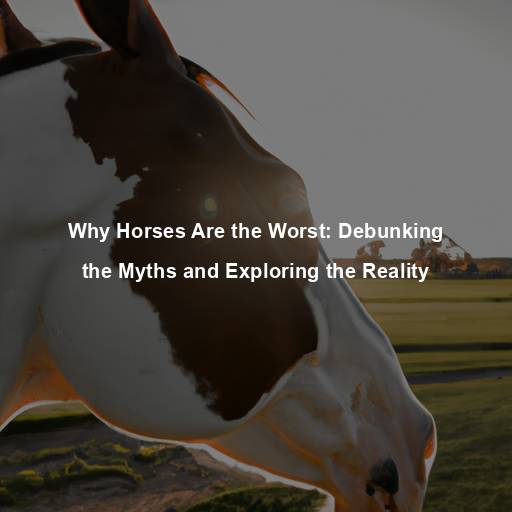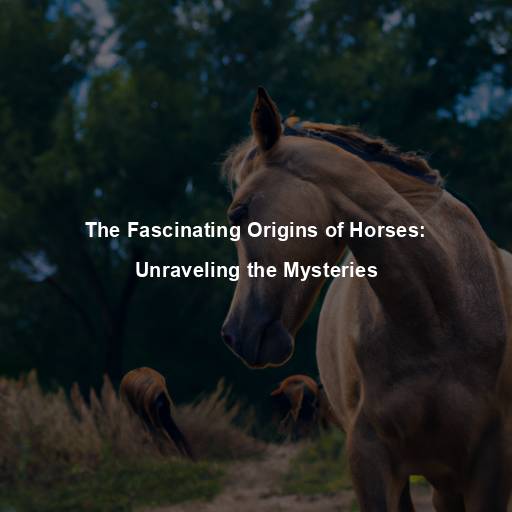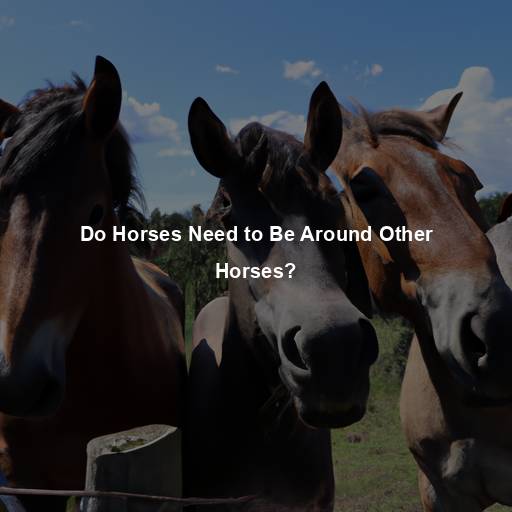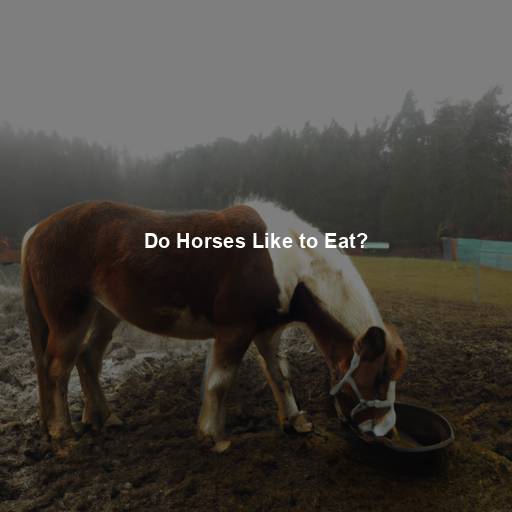What Do Horses Eat: A Comprehensive Guide to Equine Nutrition
Last Updated on November 11, 2023 by Evan
Contents
- 1 The Basics of Horse Nutrition
- 2 The Components of a Horse’s Diet
- 3 Factors Affecting Feeding Practices
- 4 Feeding Practices and Considerations
- 4.1 Grazing and Pasture Management
- 4.2 Feeding Frequency
- 4.3 Water Intake
- 4.4 Dental Health
- 4.5 Exercise and Workload
- 4.6 Climate and Seasonal Changes
- 4.7 Travel and Stress
- 4.8 Allergies and Sensitivities
- 4.9 Monitoring Body Condition Score
- 4.10 Introducing New Feeds Gradually
- 4.11 Monitoring Water Intake
- 4.12 Feeding Management for Multiple Horses
- 4.13 Regular Veterinary and Dental Check-ups
- 5 FAQs: What Do Horses Eat
- 5.1 What do horses typically eat?
- 5.2 How much forage should a horse consume daily?
- 5.3 Can horses eat grass alone?
- 5.4 Can horses eat hay all year round?
- 5.5 Should horses be given grain or concentrates?
- 5.6 Can horses eat fruits and vegetables?
- 5.7 Should horses have access to water at all times?
- 5.8 Are there any foods that horses should avoid completely?
The Basics of Horse Nutrition
Caring for a majestic creature like a horse entails bearing the weight of their nourishment, crucial for their vitality and contentment. Being herbivores with particular requirements, horses demand an intricately choreographed meal plan to ensure their well-being. Within the pages of this all-encompassing guide, we embark on an awe-inspiring journey into the enigmatic realm of equine nutrition, unveiling the secrets to their flourishing diets.
The Natural Diet of Horses
When it comes to the dietary needs of our equine friends, delving into their wild side is key. Horses are true grazers, finely tuned to thrive on a wholesome, forage-centric menu. Picture them in their native habitat, nuzzling the earth for those nourishing blades of grass, aromatic herbs, and leafy greens. It’s these fibrous feasts that keep their digestive systems downright radiant.
The Role of Forage in a Horse’s Diet
When it comes to our equine friends, forage is the name of the game. Whether it’s in the form of luscious hay or a lush pasture, this dietary cornerstone is a must-have for our majestic companions. Packed with an array of vital nutrients like fiber, protein, vitamins, and minerals, high-quality forage not only keeps their pearly whites in tip-top shape but also ensures smooth sailing through their digestive journey. It’s no wonder forage is the key to their happy tummies and contented minds.
Understanding Nutritional Requirements
Horses have specific nutritional requirements that vary depending on factors such as age, weight, activity level, and overall health. It is crucial to tailor their diet to meet these individual needs. The key nutrients that horses require include carbohydrates, protein, fats, vitamins, and minerals. Ensuring a well-balanced diet will support their growth, performance, and overall health.
The Components of a Horse’s Diet
Forage
When it comes to fueling our equine companions, forage reigns supreme. Whether it’s the familiar crunch of hay or the lush, verdant expanse of pasture, providing our horses with the right kind of forage is critical. We must be discerning in our selection, prioritizing top-notch quality that is free of pesky dust, mold, and unwanted weeds. And let’s not forget the importance of maintaining and monitoring our pastures, a task that ensures our horses receive the proper nutrition they crave.
Concentrates
As equestrian enthusiasts, we understand the paramount significance of well-rounded equine nutrition. Therefore, it is imperative to shed light on the enigmatic realm of horse concentrates, commonly referred to as hard feed or grain. These captivating concoctions serve as a supplementary source of calories and essential nutrients, encompassing an array of delectable grains such as oats, barley, and corn, along with commercially prepared pelleted feeds. Yet, in this labyrinth of choices, the perplexing task lies in deciphering the ideal concentrate for our equine companions, taking into account their unique workloads, body conditions, and intricate dietary demands.
Supplements
When it comes to ensuring the optimal health and well-being of our beloved equine companions, there are times when additional measures may be required. These measures can take the form of supplements, carefully crafted to address specific nutritional needs that horses may have. These supplements encompass a wide range, from essential vitamins and minerals to joint-supporting substances and even probiotics. Nevertheless, it is paramount to tread cautiously and depend on the expertise of a veterinarian or an equine nutritionist to determine whether these supplements are genuinely necessary and safe for our cherished horses.
Factors Affecting Feeding Practices
Age
When it comes to horses, age is not just a number, but a crucial factor that dictates their nutritional needs. From the tiny foals and weanlings to the mighty adults, each stage of life demands distinct dietary considerations. Nourishing the young ones with proper nutrition is like sowing the seeds of healthy growth and development. On the other hand, older horses may face perplexing challenges like dental problems or weight management issues that require tailored dietary solutions.
Body Condition
Keeping a horse in optimal physical condition is crucial for their overall well-being. Through body condition scoring, experts can assess whether a horse falls into the underweight, overweight, or ideal weight categories. Based on these evaluations, dietary adjustments can be tailored to address the horse’s specific needs. Furthermore, horses engaged in various levels of training or competition might require customized feeding plans to meet their ever-changing energy requirements.
Health and Special Considerations
Horses, majestic creatures that they are, can sometimes be prone to puzzling health issues that demand dietary tweaks for their well-being. Take for instance, those magnificent equines grappling with metabolic disorders such as insulin resistance or equine metabolic syndrome – they necessitate a thoughtful menu low in sugar and starch. Similarly, expectant mares, breeding stallions, or those that combat allergies, their feeding plans must embrace the art of specialization. Collaborating hand-in-hand with a trusted veterinarian or the equine nutritionist extraordinaire is an absolute must to ensure these extraordinary beings receive a tailored and appropriate regimen tailored to their unique needs.
Feeding Practices and Considerations
Grazing and Pasture Management
As we delve into the realm of equine care, it becomes abundantly clear that providing our noble steeds with ample opportunities to roam in sprawling pastures yields a myriad of benefits for their overall physical and mental equilibrium. The art of pasture management, akin to a delicate ballet, calls for measured steps like rotational grazing and vigilant surveillance of grass growth to create an ideal grazing milieu while dispelling the specter of overgrazing. Exercising caution and shunning the temptation of luxuriant pastures during specific seasons, such as the whimsical emergence of spring, acts as a safeguard against afflictions such as laminitis—a perplexing and often enigmatic condition that plagues our four-legged companions.
Feeding Frequency
Horses have a relatively small stomach, which limits their ability to consume large meals. Therefore, it is best to feed horses smaller, more frequent meals throughout the day. Ideally, horses should have access to forage at all times to mimic their natural grazing behavior. Concentrates can be divided into two or three smaller meals to avoid overloading the digestive system.
Water Intake
Adequate water intake is essential for a horse’s overall health and digestion. Horses should have access to clean, fresh water at all times. During hot weather or periods of increased activity, horses may require additional water to stay properly hydrated. Monitoring water intake and ensuring a constant supply is crucial for preventing dehydration and related health issues.
Dental Health
Taking care of a horse’s teeth is absolutely crucial when it comes to their overall well-being. It’s imperative to schedule regular dental check-ups and floating, which is the process of smoothing out any sharp edges on their teeth. This essential procedure should only be performed by a qualified equine dentist or veterinarian. By prioritizing their dental health, we can ensure that horses can properly extract the necessary nutrients from their feed, preventing any potential problems such as weight loss or discomfort during meals.
Exercise and Workload
As equestrians, we are well aware that a horse’s nutritional needs are intricately tied to their exercise regime and workload. It’s no secret that horses who partake in moderate to intense training or competitions have higher energy requirements, which are typically met through a carefully calibrated increase in concentrate feeds. However, the key to their well-being lies in the adept art of body condition monitoring and dietary adjustments. This fine-tuned approach ensures that these magnificent creatures have the fuel they need to perform at their absolute best.
Climate and Seasonal Changes
As the seasons change, it’s important to consider how climate can throw a curveball at a horse’s dietary needs. When the cold weather creeps in, horses may need some extra fuel to keep their body temperature cozy. On the flip side, in scorching heat and humidity, replenishing those vital minerals lost in sweat with electrolyte supplements is key. So, don’t forget to tweak their diet to match the ever-changing elements and ensure their well-being is always in the forefront.
Travel and Stress
Traveling and stressful events, such as competitions or changes in environment, can affect a horse’s eating habits and digestion. It is crucial to provide consistent access to good quality forage and water during these times to support their digestive health. Some horses may benefit from additional supplements or calming additives to help reduce stress and maintain their appetite.
Allergies and Sensitivities
Just like humans, horses can have allergies or sensitivities to certain feeds or ingredients. Some common allergens include specific grains, certain types of hay, or even pollen from certain plants. It is essential to carefully monitor a horse’s response to different feeds and consult with a veterinarian if any signs of allergies or sensitivities arise. Making dietary adjustments may be necessary to avoid adverse reactions.
Monitoring Body Condition Score
Keeping a close eye on a horse’s body condition score is absolutely essential when it comes to keeping them in tip-top shape. By meticulously evaluating the fat coverage in specific areas of a horse’s body, one can determine whether adjustments need to be made to their diet. Whether it’s boosting or reducing calorie intake, the goal is to achieve that coveted ideal body condition score. Striking the right balance between nourishment and maintaining a healthy weight is of paramount importance.
Introducing New Feeds Gradually
When it comes to tinkering with your noble steed’s nourishment options, proceed with caution and take it slow. Shaking up their diet too abruptly can throw a wrench in the finely tuned machinery of their digestive system, possibly culminating in a medley of gastrointestinal disturbances or even colic. By gradually introducing new feeds over the span of several sunrises, you’ll grant your horse’s system the opportunity to adapt and minimize the possibility of any unsettling tummy troubles.
Monitoring Water Intake
Proper hydration is essential for a horse’s overall health and well-being. Monitoring water intake is crucial to ensure a horse is consuming an adequate amount of water. Factors such as hot weather, increased exercise, or certain medical conditions may increase a horse’s water requirements. Providing access to clean, fresh water at all times and monitoring their intake can help prevent dehydration and related health issues.
Feeding Management for Multiple Horses
When it comes to tending a herd of horses, one must venture into the realm of nutritional intricacy and feeding enigmas. Each majestic equine possesses its own set of enigmatic cravings and peculiar dietary demands. Factors as diverse as the unyielding march of time, the burdensome weight they carry, and even their fickle state of well-being dictate the need for a tailored approach to their sustenance. By segregating their feasts or employing ingenious feed dispensers that govern accessibility, we transcend mere feeding routines and unlock the elusive art of harmonizing equine nutrition without succumbing to the biting jaws of competition or the harsh sting of domination.
Regular Veterinary and Dental Check-ups
Taking care of your horse’s well-being is of utmost importance, and regular visits to the vet can do wonders for their overall health. Through thorough dental examinations, your trusted veterinarian can tailor dietary recommendations based on your horse’s unique needs and health circumstances. By prioritizing dental health and ensuring regular floating, you can guarantee effective food digestion and proper chewing, paving the way for a happy and healthy equine companion.
FAQs: What Do Horses Eat
What do horses typically eat?
In the realm of herbivores, horses reign supreme, their voracious appetite for all things leafy and green a testament to their unique feeding habits. A connoisseur of nutrition, the equine palate is most delighted by the bountiful offerings of forage, a medley of grass and hay that satisfies their need for fiber, essential vitamins, and vital minerals. With every crunchy bite, horses nourish not only their magnificent physique but also their intricate digestive system, ensuring a harmonious balance of health and vitality.
How much forage should a horse consume daily?
On average, a horse should consume 1.5% to 2.5% of its body weight in forage each day. This means that a 1,000-pound horse would need to consume approximately 15-25 pounds of hay or grass per day. However, the exact amount may vary depending on factors such as the horse’s age, activity level, and overall health. Consulting with a veterinarian or equine nutritionist can help determine the appropriate amount for an individual horse.
Can horses eat grass alone?
Horses, those majestic creatures of the open fields, possess an incredible ability to subsist purely on the verdant banquet of grazing grass. Nature, in her wisdom, has bestowed upon these noble beasts a diet that is perfectly suited to their needs – a harmonious blend of essential nutrients, invigorating energy, and rejuvenating moisture. However, one must tread cautiously in this realm of forage, ensuring that the pasture they roam is free from the clutches of poisonous plants and never stripped bare, preserving its nourishing properties.
Can horses eat hay all year round?
Hay is an essential component of a horse’s diet, especially when fresh pasture is limited or during winter months. It provides essential nutrients and fiber necessary for proper digestion. Horses can eat hay year-round, but it’s crucial to offer good quality hay and ensure proper storage to prevent mold or dust accumulation, which can be harmful to their health.
Should horses be given grain or concentrates?
When it comes to a horse’s nutritional needs, the question of grain or concentrates can be quite perplexing. The decision to add these elements to a horse’s diet depends on various factors such as their individual requirements, workload, and body condition. It’s crucial to understand that not every horse necessarily needs grain. In fact, a balanced diet centered around forage can often suffice for most equines. However, if one does opt to introduce grain, it’s essential to follow a gradual approach and seek guidance from professionals like veterinarians or equine nutritionists. Doing so will help avoid any potential digestive complications or nutritional imbalances that could arise.
Can horses eat fruits and vegetables?
While horses can eat certain fruits and vegetables as treats, these should not replace their main diet. Some safe fruits include apples, carrots, and bananas, which can be given in moderation. However, it’s essential to avoid feeding them toxic foods like avocados, onions, or potatoes, as these can be harmful to horses.
Should horses have access to water at all times?
Ensuring an uninterrupted supply of clean and fresh water for our equine companions is of paramount importance. From aiding in digestion to maintaining optimal body temperature, water plays a crucial role in the well-being of horses. To promote a consistent and efficient hydration routine, experts suggest the use of automatic waterers or appropriately sized buckets that are diligently sanitized and replenished. By prioritizing this essential need, we can perplex any concerns related to dehydration and support the overall health of our majestic friends.
Are there any foods that horses should avoid completely?
Horses should avoid consuming foods such as chocolate, caffeine, alcohol, or any substances containing high levels of sugar or artificial sweeteners. Additionally, toxic plants, spoiled feed, or moldy hay should never be fed to horses as they can cause serious health issues or even be fatal. It’s essential to be aware of potential toxic foods and provide horses with a safe and appropriate diet.

